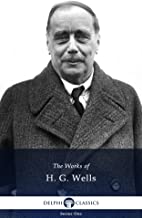What do you think?
Rate this book


In The Time Machine, a time traveler steps out of his vehicle to find himself in the year 802,701 A.D. He encounters creatures that live in perfect harmony. Or so he thinks, until he witnesses a morbid ritual and discovers that his only means of escape - his time machine - has been stolen.
A lonely island in the Pacific... the scientist who rules it... the strange beings that live there under his control. This is the backdrop for the haunting The Island of Dr. Moreau. In this novel, Wells's dark vision serves as a reminder of the horrors that reckless experimentation with nature can produce.
The Invisible Man is a dazzling display of imagination and psychological insight. It is the classic tale of a young scientist who, by experimenting on himself, becomes both invisible and criminally insane. Considered by many to be Wells's masterwork, the novel powerfully depicts the horror of a man trapped within a terror of his own creation.
War of the Worlds is a compelling and horrifying novel that describes the invasion of Earth by Martians. Using fiery rays and crushing strength, these heartless aliens have the capacity to conquer the world. Will they succeed? Is this the end of mankind?
18822 pages, Kindle Edition
First published January 1, 1924
